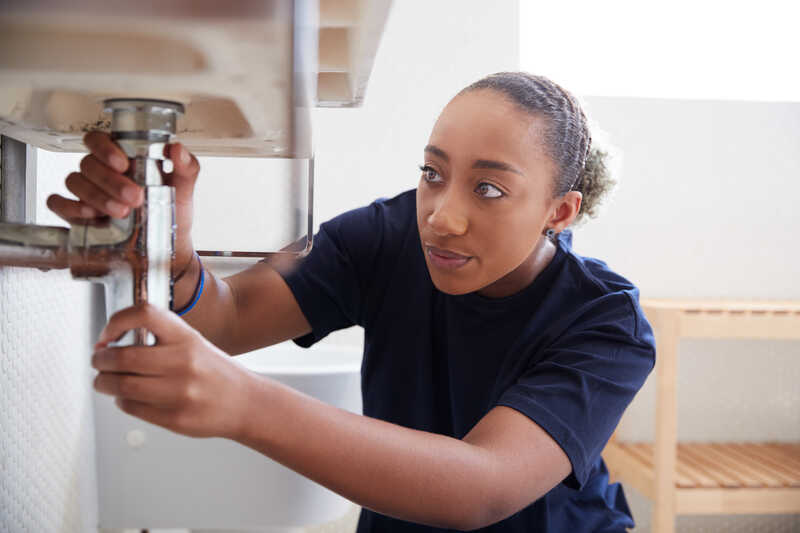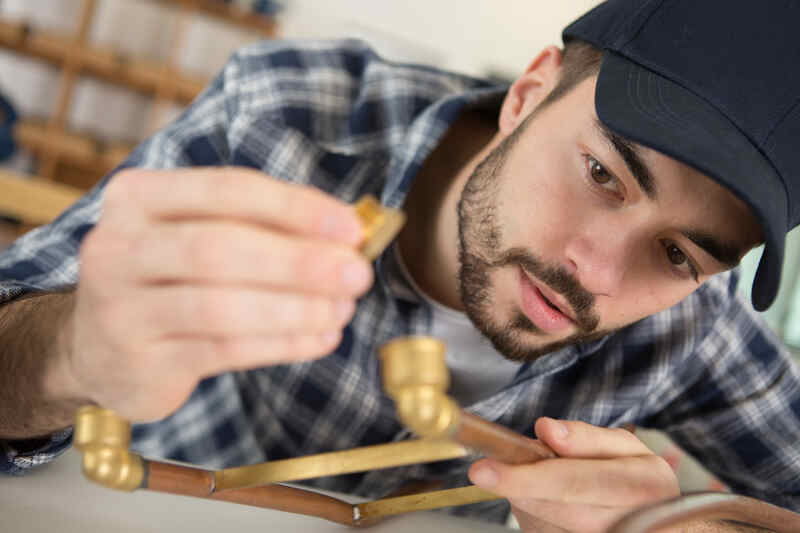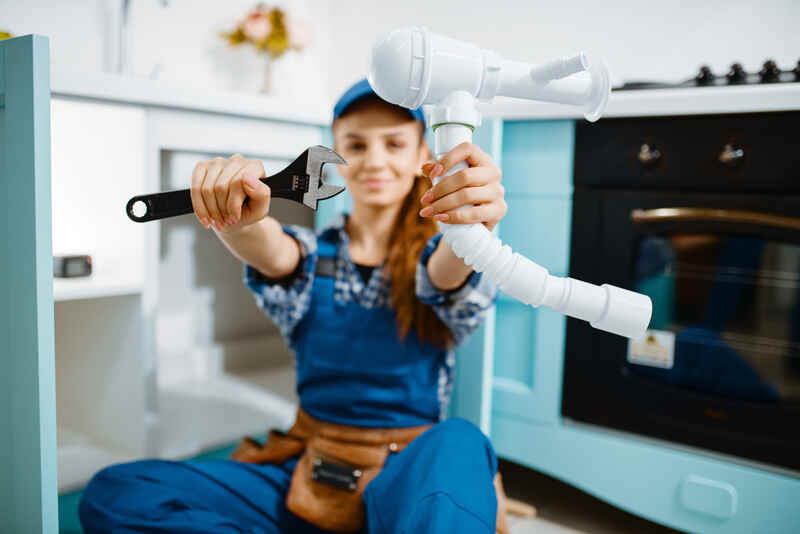What Is Residential Construction? A Guide With Tips
If you’ve got an entrepreneurial spirit and you’re handy with a wrench, plumbing could be your ticket to building your own business empire—one pipe at a time.
But what is a plumber and what do plumbers do, exactly? The answer might be more varied than you think. Plumbers are the experts who keep water flowing smoothly in our homes and businesses. They install pipes, fix leaks, and solve all sorts of water-related problems.
In this article, we’ll take a deep dive into the world of plumbing as a career. You’ll learn about the different types of plumbers, the skills they need, and what their day-to-day work looks like. We’ll also explore the business side of plumbing, including work environments and potential earnings.
RELATED ARTICLE — Expert Strategies for Successful Plumbing Marketing
What Does a Plumber Do?
Have you ever wondered what keeps a plumber busy all day? It’s not just fixing leaky faucets. Plumbers tackle a wide range of tasks to keep our water flowing smoothly and our pipes in tip-top shape. From installing brand-new systems to rushing to the rescue during emergencies, they wear many hats.
Let’s take a look at some of the primary duties that fill a plumber’s typical day.
1. Installing, Maintaining, and Repairing Plumbing Systems
Plumbers are the masters of pipes and drains. They’re the ones who make sure water goes where it should and doesn’t end up where it shouldn’t. This important job involves:
- Setting up new plumbing systems in buildings under construction
- Fixing old or broken pipes that are leaking or clogged
- Inspecting pipes regularly to catch problems before they get messy
- Replacing worn-out parts to keep everything running smoothly
You can think of plumbers as doctors for the home’s circulatory system. They diagnose issues, perform check-ups, and keep everything flowing just right.
2. Installing Fixtures and Appliances
Plumbers are the go-to experts on anything in a home or building that uses water. They handle:
- Putting in new sinks, toilets, and bathtubs
- Hooking up washing machines and dishwashers
- Setting up water heaters to keep the shower warm
- Installing garbage disposals to make kitchen clean-up a breeze
Plumbers make sure all these fixtures and appliances are connected properly and work like a charm. They’re the reason you can turn on the tap and get clean water or flush a toilet without a second thought.
3. Installing and Maintaining Gas Lines
Many plumbers are also trained to work with gas lines. This is a crucial and potentially dangerous job that includes:
- Installing gas pipes for stoves, fireplaces, and outdoor grills
- Checking for gas leaks to keep homes and businesses safe
- Repairing or replacing faulty gas lines
- Setting up gas-powered appliances like water heaters and dryers
Working with gas requires special skills and extra caution. Plumbers who do this work play a key role in keeping our homes and buildings warm and our appliances running safely.
4. Providing Emergency Services
When disaster strikes, plumbers are the rescue squad. Many offer round-the-clock help for plumbing emergencies like:
- Burst pipes flooding homes and businesses
- Severely clogged drains that won’t budge
- Broken water heaters
- Unsanitary sewer line backups
These four main plumber duties show just how varied and important a plumber’s job can be. From routine maintenance to emergency rescues, plumbers keep our modern world running smoothly, one pipe at a time.
RELATED ARTICLE — SEO for Plumbers: Strategies & Tips to Boost Plumbing Leads
Types of Plumbers

Plumbers specialize in different types of plumbing work, each with its own set of requirements and responsibilities. Some focus on fixing leaky faucets in residential homes, while others tackle massive pipe systems in huge factories.
Let’s explore the main types of plumbers and what makes each one unique:
Residential Plumbers
These are the friendly faces you’re most likely to see in your home. They’re the go-to experts for:
- Fixing that dripping kitchen sink
- Unclogging stubborn toilets
- Installing new showers or bathtubs
- Repairing or replacing water heaters
Commercial Plumbers
These plumbers work their magic in businesses, from small shops to big office buildings. They typically work on larger systems and may need to solve problems without disturbing a busy workday
They handle:
- Setting up restrooms for employees and customers
- Installing water fountains and break room sinks
- Maintaining fire sprinkler systems
- Fixing plumbing issues in restaurants and hotels
Industrial Plumbers
These are the heavy-duty plumbers. They work in factories, power plants, and other industrial settings. Their job involves:
- Installing and maintaining large-scale water systems
- Working with specialized pipes that carry chemicals or gasses
- Setting up complex drainage systems
- Ensuring water quality meets strict industry standards
Industrial plumbers need extra training to handle the unique challenges of these big, complex systems.
Construction Plumbers
These plumbers are part of the team that brings new buildings to life. They:
- Install plumbing systems in houses and buildings under construction
- Work closely with architects and other construction pros
- Make sure new plumbing meets building and plumbing codes and safety rules
- Plan and design efficient plumbing layouts for new structures
Sanitary Plumbers
These are the cleanup crew of the plumbing world. They focus on:
- Installing and maintaining sewage systems
- Dealing with septic tanks
- Ensuring proper waste disposal in buildings
- Keeping things hygienic and preventing health hazards
Sanitary plumbers play a crucial role in public health by managing waste safely and effectively.
FROM ONE OF OUR PARTNERS — Commercial Plumbing vs. Residential Plumbing
Must-Have Skills for the Plumbing Industry

If you’re thinking about joining the plumbing world, there are some key skills you’ll need to succeed:
- Technical Skills. These are essential for understanding how plumbing systems work and how to fix them.
- Tool Mastery. This involves knowing how to use a wide range of plumbing tools effectively.
- Physical Fitness. Being in shape is key for lifting heavy objects and working in tight spaces.
- Problem-Solving Ability. This is needed for figuring out tricky issues and finding creative solutions.
- Communication Skills. These are important for clearly explaining problems and solutions to customers.
- Customer Service Skills. Keeping clients happy, even when dealing with messy situations, is important for any business.
What Is the Work Environment Like for a Plumber?
A plumber’s workplace can be as varied as the work they do. One day, they might be working in a tight crawl space under a house, and the next they might be perched on the roof of a skyscraper.
The work setting depends on the type of plumber:
- Residential Plumbers. They might find themselves in cozy homes or drafty basements.
- Commercial Plumbers. They often work in busy office buildings or bustling restaurants.
- Industrial Plumbers. They tackle jobs in noisy factories or sprawling power plants.
- Construction Plumbers. They spend their days on active building sites.
- Sanitary Plumbers. They might work in city sewers or at wastewater treatment plants.
No matter where they work, plumbing is physically demanding. Lifting heavy pipes, squeezing into tight spaces, and sometimes working in chilly weather or scorching heat are all part of the job. Plumbers need to be ready for anything—including middle-of-the-night emergencies. Many are on-call, ready to rush out and save the day when a pipe bursts at two in the morning.
FROM ONE OF OUR PARTNERS — How to Become a Licensed Plumber
Average Plumber Salary
Let’s talk about money. Plumbing isn’t just about unclogging drains. It can also be a path to a solid paycheck. The exact amount will vary depending on where you live and how much experience you have.
On average, plumbers make just under $30 an hour. However, as in any business, you have the potential to earn a lot more. Plumbers who run their own businesses have the chance to rake in a significantly higher income.
Licensed plumbers’ earnings also vary based on their level of experience and licensing status. Apprentices, who are just starting out in apprenticeship programs, earn less while they learn on the job. Journeyman plumbers, who have completed their training but aren’t yet at the highest level, earn more. Master plumbers, with years of experience and advanced skills, top the pay scale.
By building a reputation, hiring a team, and expanding their services, many plumber-entrepreneurs succeed in turning their skills into thriving businesses. So, whether you’re looking for a steady job or dreaming of building your own plumbing empire, plumbing offers some attractive financial possibilities.
FROM ONE OF OUR PARTNERS — How to Grow a Plumbing Business
7 Safety Tips for Plumbers

Plumbing isn’t the most dangerous job in the world, but it comes with its own set of risks. From slippery floors to toxic fumes, some plumbers face challenges that require more than just a wrench to solve. That’s why safety is a top priority in this line of work.
Here are some critical tips to keep plumbers safe on the job:
- Use Proper Ventilation. When working in tight spaces or with strong chemicals, make sure there’s plenty of fresh air flowing. Open windows or use fans to keep the air moving.
- Wear a Mask. If you’re dealing with dangerous chemicals, gasses, or even a lot of dust, protect your lungs by wearing a high-quality, well-fitting mask.
- Wear Eye Protection. Flying debris and splashing liquids are no joke. Keep your eyes safe with goggles or safety glasses.
- Protect Your Ears. Plumbing can get noisy. Use earplugs or earmuffs when working with power tools or in noisy environments.
- Cover Up. Long sleeves, gloves, and pants can protect you from cuts, burns, and harmful substances.
- Wear Protective Footwear. Sturdy, non-slip boots can prevent falls and protect your feet from falling objects.
- Watch Out for Electrical Hazards. Water and electricity don’t mix. Always be aware of electrical sources when working around water.
RELATED ARTICLE — Plumbing Pricing Guide: How to Price Plumbing Jobs
Win More Clients On-The-Spot With Quick and Professional Estimates
Take your plumbing career to the next level by streamlining your estimate process and winning more jobs.
Create and share estimates in just minutes with our easy-to-use mobile estimating tool. Packed with powerful features built for contractors, including Deposits, Markups, Contracts, and Photos.